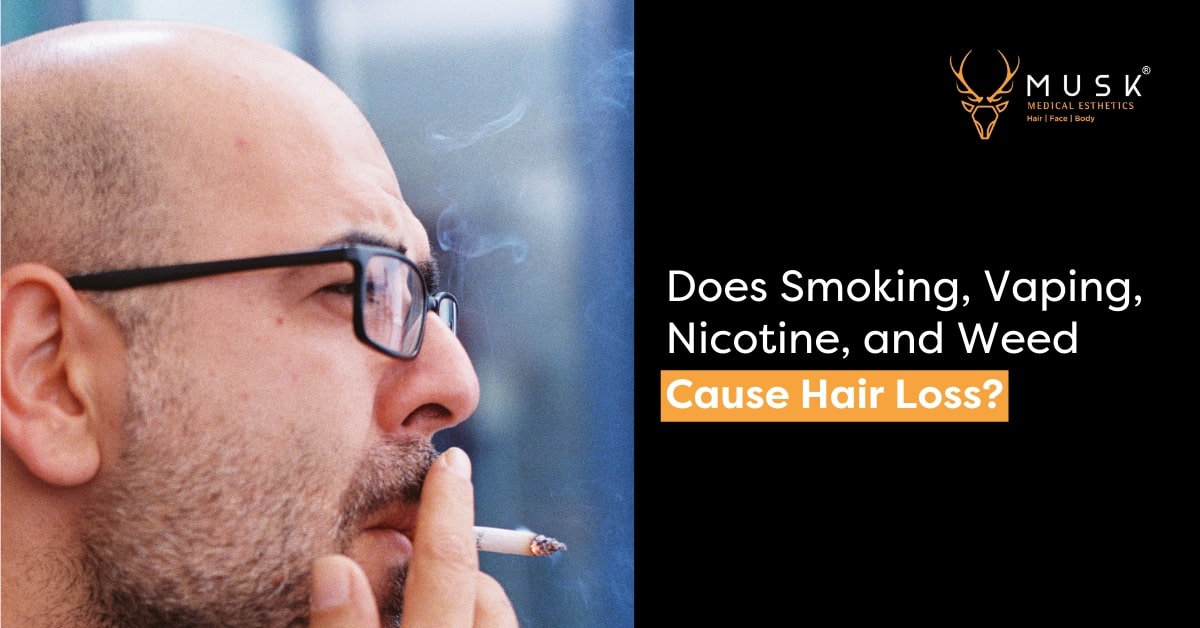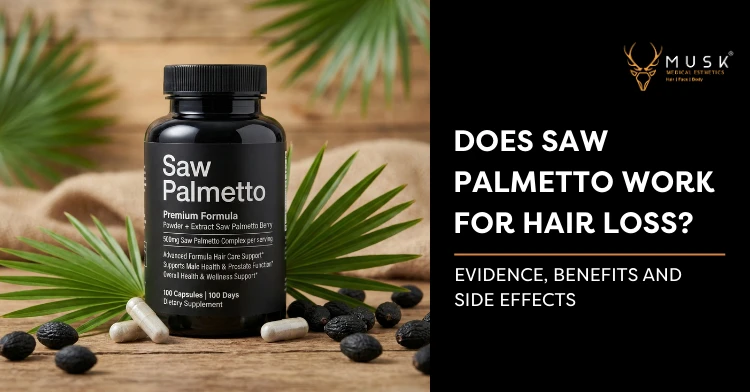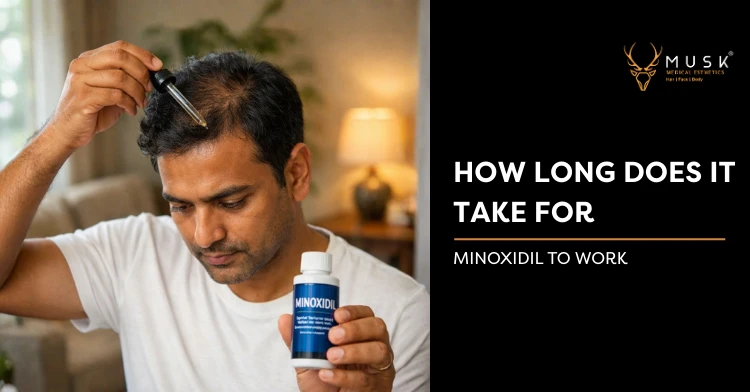Does Smoking, Vaping, Nicotine, and Weed Cause Hair Loss?

Have you ever run your fingers through your hair and noticed more strands than usual coming out?
Hair loss is a common concern that affects millions of people worldwide, and it can be caused by a variety of factors. From genetics and age to stress and diet, many things can contribute to thinning hair or baldness.
But what about your habits?
You might be wondering if your daily smoke break or weekend vape session could be causing you hair loss. Or perhaps you’re curious about whether that joint you enjoy occasionally might be impacting your hairline.
In this blog post, we’ve discussed everything about smoking hair loss, vaping, nicotine, and even marijuana use to see how they might be affecting your hair health.
Does Smoking Cause Hair Loss?
We all know that lighting up a cigarette isn’t great for your health, but can smoking cause hair loss?
The short answer is — quite possibly, yes.
Smoking has a wide-ranging impact on your overall health, and your hair isn’t immune to its effects. When you puff on a cigarette, you’re not just harming your lungs; you’re potentially damaging your hair follicles too.
Here’s how:
First of all, smoking reduces blood flow throughout your body, including to your scalp.
You see, your hair follicles need a good supply of oxygen and nutrients to grow strong, healthy hair. But when you smoke, you’re essentially cutting off their food supply.
And that’s not all. The toxins in cigarette smoke can also directly damage the DNA in your hair follicles. This damage can lead to weaker, thinner hair that’s more prone to falling out.
Indirectly, smoking can also wreak havoc on your hair health. It increases oxidative stress in your body, leading to more free radical damage. Additionally, smoking can mess with your hormones, potentially increasing levels of hormones that contribute to hair loss.
The mechanisms behind smoking hair loss are complex, but they all point to one conclusion — smoking is bad news for your hair.
It can disrupt the normal hair growth cycle, pushing more of your hair into the “shedding” phase prematurely. This can result in noticeable thinning over time.
So, if you’ve been wondering, “Do cigarettes cause hair loss?”, the evidence suggests that yes, they likely do.
Does Vaping Cause Hair Loss?
Now, let’s turn our attention to a more recent trend: vaping. You might be thinking, “Well, at least vaping is safer than smoking, right?”
While it’s true that vaping eliminates some of the harmful chemicals found in cigarette smoke, it’s not without its own potential risks – including possible effects on your hair.
So, can vaping cause hair loss?
Well, vaping, or using e-cigarettes, involves inhaling vapor produced by heating a liquid that usually contains nicotine, flavorings, and other chemicals.
While it doesn’t produce the same tar and carbon monoxide as traditional cigarettes, it’s not exactly a healthy food either.
The main culprit when it comes to vaping and hair loss is likely the nicotine content. Most e-cigarettes contain nicotine, which, as we’ll discuss in the next section, can have negative effects on hair health. However, the other chemicals in e-liquids could also potentially play a role.
Research on the specific effects of vaping on hair loss is still limited, largely because vaping is a relatively new phenomenon.
Theoretically, the mechanisms of vaping-induced hair loss could be similar to those of smoking-induced hair loss. The nicotine in e-cigarettes can still cause vasoconstriction (narrowing of blood vessels), potentially reducing blood flow to the scalp.
Additionally, some of the chemicals in e-liquids might contribute to oxidative stress or hormonal imbalances.
However, it’s important to note that vaping eliminates many of the harmful combustion products found in cigarette smoke, which could potentially make it less damaging to hair health than traditional smoking.
So, if you’re wondering, “Does vaping cause hair loss?”, the honest answer is that given what we know about nicotine and the potential effects of other chemicals in e-liquids, it’s certainly possible that vaping could contribute to hair loss.
Does Nicotine Cause Hair Loss?
Nicotine is a fascinating substance. It’s an addictive component in tobacco products and is also present in most e-cigarettes.
While it’s often associated with cigarettes, nicotine can be found in other sources too, like nicotine gum or patches used for smoking cessation.
When it comes to hair health, nicotine can be problematic in several ways.
For starters, nicotine is a vasoconstrictor. In simpler terms, it narrows your blood vessels. This reduction in blood flow can affect your entire body, including your scalp.
Remember how we talked about hair follicles needing a good blood supply?
Well, nicotine throws a wrench in that system.
With reduced blood flow, your hair follicles might not get all the oxygen and nutrients they need to produce strong, healthy hair.
Other than this, nicotine can also indirectly affect your hair health by messing with your hormones. Some studies suggest that nicotine might increase the production of DHT (dihydrotestosterone), a hormone that’s been linked to male pattern baldness. So if you’re genetically predisposed to hair loss, nicotine could potentially speed up the process.
Stress is another factor to consider. While nicotine might feel relaxing in the moment, it’s actually a stimulant that can increase stress levels in your body over time. And as you might know, stress can be a significant contributor to hair loss.
Last but not least, it’s worth noting that nicotine replacement therapies, like patches or gum, might have less of an impact on hair health than smoking or vaping. This is because they deliver nicotine in a controlled way without the additional harmful chemicals found in cigarette smoke or e-liquids. However, they’re not entirely without risk when it comes to hair health.
So, if you’re using nicotine in any form and noticing more hair in your brush lately, it might be worth considering whether your nicotine habit could be contributing to the problem.
Does Weed Cause Hair Loss?
Whether you call it weed, pot, or marijuana, cannabis use has become increasingly common and accepted in many parts of the world.
But can weed cause hair loss?
For the uninitiated, weed or cannabis is a plant that contains numerous chemical compounds, including THC (tetrahydrocannabinol) and CBD (cannabidiol). These compounds interact with your body’s endocannabinoid system, which is involved in regulating various physiological processes – including, potentially, hair growth.
Put simply, weed could potentially affect your hair health indirectly in several ways.
For one, regular cannabis use might impact your eating habits. We’ve all heard of the “munchies,” right? Well, if those munchies lead you to consume a lot of unhealthy foods, it could potentially impact your overall nutrition – including the nutrients your hair needs to grow strong and healthy.
Cannabis use can also affect your sleep patterns. While it might help you fall asleep faster, it can disrupt the quality of your sleep, particularly if used regularly.
Poor sleep can eventually increase stress levels and throw off your hormonal balance, both of which can contribute to hair loss.
Furthermore, hair loss due to cannabis can also depend on how you consume it. If you’re smoking it, you’re exposing yourself to some of the same risks as tobacco smoking, including reduced blood flow to the scalp and exposure to harmful combustion products.
However, other forms of consumption, like edibles or topical applications, might have different effects. Some people even claim that topical application of CBD oil can help with hair growth, although there is no scientific evidence available to prove this claim.
All in all, it is safe to say that occasional cannabis use is probably less likely to cause significant hair loss compared to habitual tobacco smoking or heavy alcohol use.
However, if you’re a regular user and you’re noticing changes in your hair, it might be worth considering whether your cannabis use could be a contributing factor.
What Can You Do to Prevent Hair Loss?
If you’re concerned about hair loss and you’re a user of any of these substances – be it cigarettes, vapes, or cannabis – you might be wondering what steps you can take to protect your hair health.
Here are some strategies to consider:
1. Consider Quitting or Reducing Smoking/Vaping
This is often the most effective strategy. If you stop smoking or vaping, you may see improvements in your overall health, including your hair health.
Remember, if you ask, “if I stop vaping will my hair grow back? ” the answer is that while quitting doesn’t guarantee hair regrowth, it can certainly create a healthier environment for your hair follicles.
2. Focus on Hair Care
The second best thing you can do is adopt a hair care routine that nurtures and protects your hair.
Here are a few things we recommend:
- Use gentle, sulfate-free shampoos and conditioners
- Avoid harsh chemicals like bleach or strong dyes
- Limit heat styling, and always use a heat protectant when you do
- Be gentle when brushing or styling your hair, especially when wet
- Consider using a silk or satin pillowcase to reduce friction while you sleep
- Try scalp massages to stimulate blood flow to your hair follicles
3. Eat a Balanced Diet
As we mentioned multiple times, your hair needs proper nutrition to grow strong and healthy.
This is why you must include the following in your diet:
- Protein — Hair is made mostly of protein, so include lean meats, fish, eggs, or plant-based proteins in your diet.
- Iron — Iron deficiency can lead to hair loss. Consume iron-rich foods like spinach, lentils, and red meat.
- Omega-3 fatty acids — Found in fish, walnuts, and flaxseeds, these can help keep your scalp healthy.
- Vitamins A, C, and E — These vitamins support the production of sebum, which moisturizes your scalp.
- B vitamins — Biotin (B7) is particularly important for hair growth
- Zinc — This mineral supports hair growth and repair
4. Stay Hydrated
Drinking plenty of water is super important for your whole body, including your hair. Ideally, you should drink at least 8 big glasses of water every day. That might sound like a lot, but you can spread it out over the whole day.
When you drink enough water, it helps carry all the good nutrients from the food you eat to your hair follicles.
These follicles are like the roots of your hair, and they need these nutrients to grow strong, healthy hair.
Furthermore, water also helps flush out toxins from your body. These toxins can sometimes build up and affect your hair growth. By drinking lots of water, you’re helping your body get rid of these bad substances, which can lead to healthier hair.
5. Manage Stress
Since stress can contribute to hair loss, finding effective stress management techniques can be helpful.
Here are the top recommendations:
- Regular exercise — It boosts endorphins and reduces stress.
- Meditation or mindfulness practices — These can help calm your mind and reduce anxiety.
- Yoga — It combines physical activity with mindfulness for stress relief.
- Adequate sleep — You should try to get 7-9 hours of sleep per night.
- Hobbies — You can consider engaging in activities you enjoy to relax and de-stress.
6. Consider Supplements
Some supplements may help support hair health. However, always consult with a healthcare provider before starting any new supplement regimen.
Some supplements that may be beneficial include:
- Biotin — Supports keratin production.
- Vitamin D — Many people are deficient, and it plays a role in hair follicle cycling.
- Iron — If you’re deficient, iron supplementation can help with hair loss.
- Collagen — May improve hair strength and thickness.
7. Explore Medical Treatments
If you’re experiencing significant hair loss, there are medical treatments available:
- PRP therapy — Platelet-rich plasma injections may stimulate hair growth.
- Hair transplants — For more severe cases, surgical options like FUE (Follicular Unit Extraction) or FUT (Follicular Unit Transplantation) might be considered.
- Low-level laser therapy — It’s a non-thermal treatment that uses a low-power laser to promote tissue healing, reduce inflammation, and relieve pain. Some studies suggest this can stimulate hair growth.
Will My Hair Grow Back If I Quit Vaping/Smoking?
If you’re considering quitting vaping or smoking, you’re probably wondering about hair recovery.
The good news is that quitting these habits can definitely improve your hair health! When you stop smoking or vaping, your body begins a healing process that can benefit your hair in several ways.
Within just a few days of quitting, your blood circulation starts to improve. This means your hair follicles get better blood flow, which brings more oxygen and nutrients to support healthy hair growth.
Many people notice that their hair feels healthier and looks more vibrant within a few months of quitting.
However, it’s important to have realistic expectations. Hair growth is a slow process – it typically grows about half an inch per month. This means you might not see dramatic changes overnight.
The timeline for hair recovery can vary depending on:
- How long you’ve been smoking or vaping
- The extent of hair loss
- Your overall health and nutrition
- Your age and genetics
- Other lifestyle factors
Some people notice new hair growth within 3-6 months of quitting, while others might take longer to see significant improvements.
The key is to be patient and maintain other healthy habits that support hair growth during this time.
Is Smoking/Vaping Caused Hair Loss Reversible?
This is a common question, and the answer is: it depends.
Hair loss caused by smoking or vaping can often be reversed, especially if you catch it early.
However, the degree of reversibility depends on several factors:
The type of hair loss:
- If your hair loss is primarily due to reduced blood flow and nutrition to the follicles, it’s often reversible
- If the follicles have been permanently damaged or scarred, recovery might be more limited
- If genetic factors (like male pattern baldness) are also involved, you might need additional treatments
The timeline of recovery can vary:
- Some damage might be reversed within a few months of quitting
- More severe cases might take 6-12 months to show improvement
- In some cases, you might need medical intervention to stimulate regrowth
To maximize your chances of hair recovery:
- Quit smoking or vaping completely
- Follow a healthy diet rich in hair-growing nutrients
- Stay well-hydrated
- Manage stress levels
- Use gentle hair care products
- Consider supplements or treatments recommended by a healthcare provider
Remember, while some hair loss might be reversible, prevention is always better than cure.
So, the sooner you quit smoking or vaping, the better your chances of maintaining healthy hair.
Conclusion
Hair loss is often a complex issue with multiple contributing factors.
Your genes, age, stress levels, and overall health all play significant roles too.
If you’re noticing changes in your hair and you use any of these substances, it might be worth considering how they could be affecting your hair health.
Whether you’re a smoker looking to quit, a vaper wondering about long-term effects, or a cannabis user curious about its impact, there are steps you can take to support your hair health.
But sometimes, you might need a little extra help. That’s where the experts at Musk Clinic come in.
At Musk Clinic, we understand that hair loss can be a sensitive and complex issue. Our team of experienced professionals specializes in diagnosing and treating various types of hair loss, using the latest research and cutting-edge treatments.
Remember, it’s never too late to start taking better care of your hair. With the right professional help, you can work towards maintaining a healthy, full head of hair for years to come.











